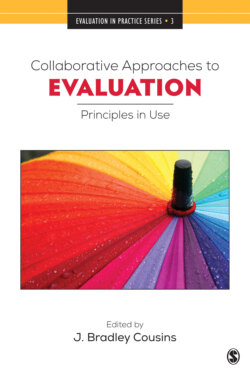Читать книгу Collaborative Approaches to Evaluation - Группа авторов - Страница 17
На сайте Литреса книга снята с продажи.
When Transformation Is Intentional
ОглавлениеGiven its evident connection to evaluation-related learning, process use is very much implicated in ECB and therefore highly relevant in evaluations that are intended to be transformational in form and function (Mertens, 2009; Whitmore, 1998b). In transformational approaches, interest is less about generating evaluation findings that will be acted upon to leverage change and more about the experience. Through participation in the cocreation of evaluation knowledge, members of the program community, particularly intended beneficiaries of interventions, stand to profit. Much of this benefit will be cognitive or conceptual, which is to say, members stand to learn not only about the program and its functions but also about the historical, political, social, and educational aspects of the context in which it is situated. But of course, the idea is that when people critically analyze and learn about their situation, they will use this learning to push for change (Freire, 1970). It is through the deepening of understanding by virtue of engaging with evaluation that transformation and/or empowerment is likely to occur (Mertens, 2009).
Previously we discussed tensions between accountability and learning, which are often acknowledged as fundamental functions of evaluation, and we hinted that transformation may provide a third perspective. In a recent chapter, Cousins, Hay, and Chouinard (2015) argued that learning is often juxtaposed to compliance-oriented accountability as opposed to accountability as a democratic process, and that this is the root source of tension between the two. The authors went on to argue that
when rooted in transformative participatory evaluation approaches and motivated by political, social-justice interests, accountability and learning approaches are no longer in opposition … [they are] essential, necessary, and supplementary, to be most appealing and indeed, necessary if evaluation is to be relevant to addressing issues of poverty, inequity and injustice. (p. 107)
Transformational interests provide a natural fit for CAE.
